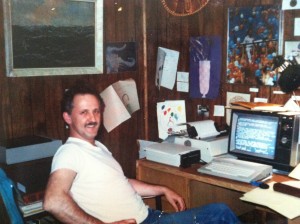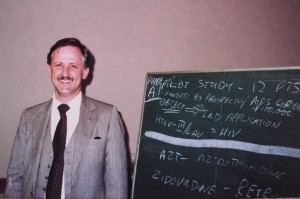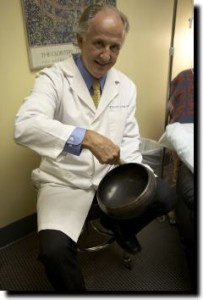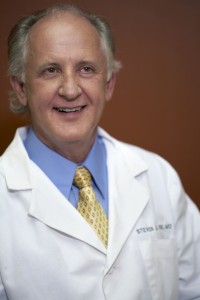Steven G. Ayre MD (January 19, 1945 – July 12, 2013)
Dr. Ayre devoted his medical career to improving his personal practice of medicine and improving the experience of people receiving medical treatment for cancer. His life and work are a continued inspiration for the work we do at the Ayre Clinic for Contemporary Medicine.
His Curriculum Vitae outlining his clinical, research, and community service activities can be found here:
His philosophy, personal story of how he came to be involved in the work of Insulin Potentiation Therapy, and his musings on this world he loved can be found below:
Insulin Potentiation Therapy (IPT) has been a personal passion of mine, as well as my dedication to the medical profession, ever since I first learned of it back in September of 1975. During the years between 1975 and 1999, I chose not to proceed with the actual practice of IPT myself, but elected rather to develop something in the way of a scientific basis for it. I understood this to be a most important first step before consideration could be given any novel idea in medicine. Why am I doing this? Because in my class on Medical Ethics back in second year at the University of Ottawa Medical School, I remember reading in my little pamphlet on the subject that were a physician to discover something of value while working to help his patients, it would be his/her ethical responsibility to communicate such findings to his/her medical community. And so I am.
IPT was developed empirically in the early 1930’s by Donato Perez Garcia, Sr., M.D. in Mexico City, at a time when the requisite scientific sophistication for clearly describing how insulin worked in his therapy did not exist. The science for this did not develop until the late 1970’s. Taking advantage of this evolution in science and acting in the capacity of scientific liaison for the Dr. Perez Garcia family of physicians (see IPT History), I managed to get five articles on IPT published in recognized medical journals under our combined authorship.
My passion and dedication to developing IPT has been sustained over these many years by

numerous reports of anecdotal successes by the Drs. Perez Garcia using the therapy in the treatment cancer – as well as in many other diseases processes. I chose to focus uniquely of the application of IPT in the treatment of cancer because that is where there was the best science – findings associating the molecular biology of cancer with the physiology of the hormone insulin and its related compounds. The story constructed from these scientific findings, coupled with the decades of reported anecdotal results, I believe provides a compelling intellectual argument for proceeding with a program of clinical study for this medical innovation.
As a physician, my primary concern has always been to provide the highest quality of patient care. Cancer is the condition for which it is said that the treatment is worse than the disease. It is an acknowledged fact that the one factor above all that has driven the rapid growth of interest in alternative medicine in the American patient population is the desire to have improved treatments for cancer. For myself, the importance of IPT is the possibility that it may prove to be of value in providing an improved quality of care for cancer patients. From the years of experience with IPT, both abroad and now here in the United States, there is little question but that the reduced doses of chemotherapy used in the protocol do afford patients side-effect free treatment with these powerful drugs. In this connection, one other very important point about IPT and cancer treatment was emphasized in the following statement from the Cancer Advisory Panel meeting in September, 2000: “If IPT is found to be at least as effective as current conventional treatment, it would be considered an improved therapy.” (http://nccam.nih.gov/ nccam/ne/newsletter/fall2000/capcam.htm) This important question about IPT is to be addressed in forthcoming clinical trials.
All of these developments have taken place over a long period of time in my life. At the beginning, my motive was to try and beat the medical profession into submission to accept what I was certain was a simple and wonderful new idea. I was in a hurry. Many years into the fray, worn out and worn down, I came to realize that IPT would be better offered as a gift rather than a foregone conclusion from my own belief system. I also recognized that for any gift to be received, this must first be made properly acceptable – and so my work proceeded. Through this work, I myself learned as much from IPT as I thought I might be able to teach others with it. Now I look forward to the day when mainstream specialists in medical oncology will have access to this treatment. I think they would love it – should studies prove its value. I pray that this may be the case – for these physicians, and for the cancer patients they care for as they do.
I am certain that IPT will not cure everybody with cancer. I am hopeful that it will help control cancer in many patients. I believe that IPT will do no harm to patients from chemotherapy drug reactions. As far as proposed clinical studies on IPT are concerned, I remain surrendered to the outcome – come what may. With my work on IPT, this much I have learned: “Thy will, Oh Lord, not mine, be done.”
Philosophical Perspectives on Comprehensive Cancer Care and The Prevention of Cancer
Prior to my medical education, I received a Bachelor of Arts degree from McGill University in my hometown of Montreal. My major was Philosophy and Comparative Religion. Because of frustrations over many long years with the pace of efforts to interest medical science in IPT, I took a measure of comfort in reflecting on things from my philosophical perspective. I must first say that I am not one to believe those stories of there being some sinister conspiracy between government and industry to interfere with the evolution of new cancer treatments in this country. I do believe, however, that there are processes of evolution at work unwinding things in two important areas related to cancer. One of these has to do with a changing perception about the scientific method itself, and the other involves a new immediacy a propos our common understanding of this disease we call cancer.

Contemporary writings by eminent scientists – many of them Nobel laureates – have characterized compelling evidence for an alternate view of things concerning our scientific methodology. Discoveries in the areas of quantum theory and human conscious awareness have created a new paradigm for science, one that places our own human psychological and spiritual realities on a comparable footing with the classically observed facts of modern science: what science has always regarded as objective truth is now seen to be intimately associated with our own human subjectivity. Surprisingly, this new understanding now makes it rational and acceptable for us to actually want what we want from our scientific investigations through a phenomenon called “top-down causality.” We are thus no longer limited by having to accept what truths may simply tumble out from our scientific experiments. To be sure, this new perspective of working purposively with our science represents a tremendous breakthrough – as well as an immense challenge to modern scientific theory, and to the many scientists accustomed to working with this.
Just as immense is the shift in our societal awareness of the meaning that cancer has come to have in all of our lives. Cancer in the United States is definitely on the rise. We represent 6 percent of the world’s population, and yet we account for 20 percent of the world’s cases of cancer. More personally, statistics from the Centers for Disease Control tells us that one man in two alive now in America, and one woman in three, may expect to get cancer in their lifetime. And the projection is that by the year 2050, these statistics will become one in one for both men and women. We are thus facing a potential human tragedy of totally unmanageable proportions.
I have heard it said that, “Cancer is not the disease; cancer is the cure. Civilization is the  disease.” Looking realistically at what we have done on this planet, it seems this may be true. The growth of our Western civilization has proceeded hand in hand with an ever increasing and widespread process of industrialization, all under our “sacred” imperative of a never ending process of economic growth and development. If there is supposed to be some balance between the scared and the profane within a mature society, we would have to admit that the profane has all but taken over here where we live. We are collectively striving towards a non-sustainable future. The unwanted result of all this is pollution – external and internal: pollution of the air and water in our natural environment, pollution of the quality of our food supply, and a pollution of those natural feelings of compassion and loving kindness for ourselves and for one another as we all compete, individually, to “get ahead.” And I believe the bottom line in all this has come to be our burgeoning epidemic of cancer.
disease.” Looking realistically at what we have done on this planet, it seems this may be true. The growth of our Western civilization has proceeded hand in hand with an ever increasing and widespread process of industrialization, all under our “sacred” imperative of a never ending process of economic growth and development. If there is supposed to be some balance between the scared and the profane within a mature society, we would have to admit that the profane has all but taken over here where we live. We are collectively striving towards a non-sustainable future. The unwanted result of all this is pollution – external and internal: pollution of the air and water in our natural environment, pollution of the quality of our food supply, and a pollution of those natural feelings of compassion and loving kindness for ourselves and for one another as we all compete, individually, to “get ahead.” And I believe the bottom line in all this has come to be our burgeoning epidemic of cancer.
These perceptions about our ecology and our social (dis)integration may stand as a critical new focus for our collective attention. A motive to arrest this destruction has to come to the fore – and soon. The power of a new science responsive to conscious human desire, directed by the evident danger and urgency in our current circumstances, can and must lead us to more promising possibilities for our future.
It should be clear from these opinions that dealing effectively with cancer is going to take more than just time, money, and better ways of killing cancer cells. As necessity is the mother of invention, a new and broader approach to cancer management has already made inroads into the existing medical scheme of things. This is called Comprehensive Cancer Care. There are three distinct therapeutic areas in this: 1) Methods for treating the cancer; 2) Nutritional biochemistry to support improved immune function; and 3) Mind-Body medicine for deeper healing.
As a method of treating cancer, IPT may represent the ideal modality for the first approach in this model of Comprehensive Cancer Care. The other therapeutic approaches of Nutrition and Mind-Body medicine demand high levels of patient participation. Because of the non-toxic nature of chemotherapy treatments given with IPT, patients are going to feel much better under treatment with it as compared to the typical reactions seen with conventional dose chemotherapy. IPT patients will be much more available – physically and emotionally – to participate in making better choices about what they might eat and drink, and how they might think and feel. It is my hope and expectation that this kinder and gentler and more comprehensive approach to cancer management will prove significantly more effective than extant medical practices.
There is a great deal more depth and breadth to Comprehensive Cancer Care than can simply be spelled out here in words. It is difficult to see how medicine as it is currently structured could allow physicians to even speak some of these words to their patients – words like love, soul, and God. Some further evolutionary steps – and possibly some revolutionary ones – will have to be taken before we are all free enough to overcome our fears of being who we are with each other, and able to act with genuine power and authenticity.
One of my favorite philosophical thinkers was a man of inspiration by the name of Pere Teilhard de Chardin. He spoke optimistically of Man soon coming of age, and assuming responsibility for participating – together with God – in his own ongoing process of evolution. This one of his quotations below captures much of what I feel to say about where we are going, and where I believe the disease called cancer would have us go: to rise above, to survive, and to positively enjoy our existence together on this good earth.
Some day, after we have mastered
The winds, the waves, the tides, and gravity,
We shall harness for God the energies of love.
Then for the second time in the history of the world,
Man will have discovered fire.
– Pere Teilhard de Chardin

